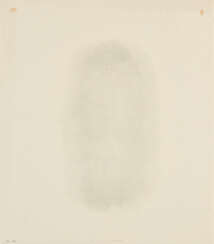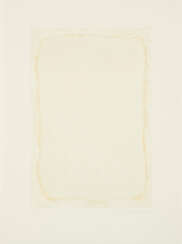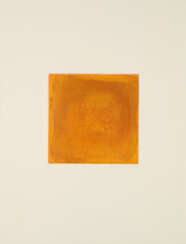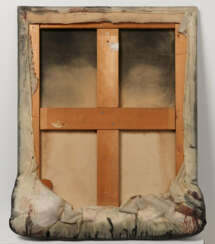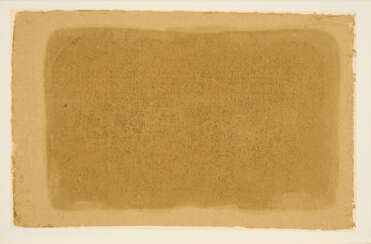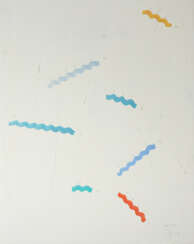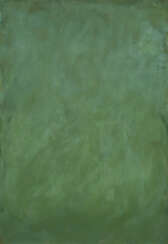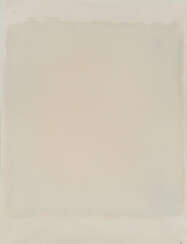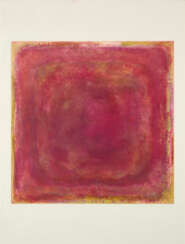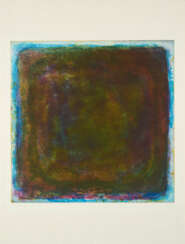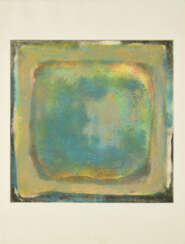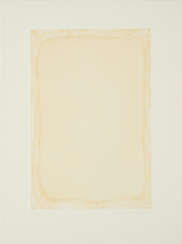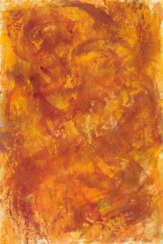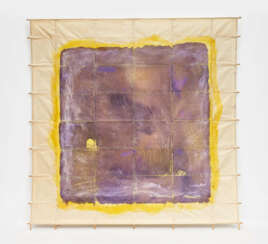Gotthard Graubner (1930 - 2013) — Auction price
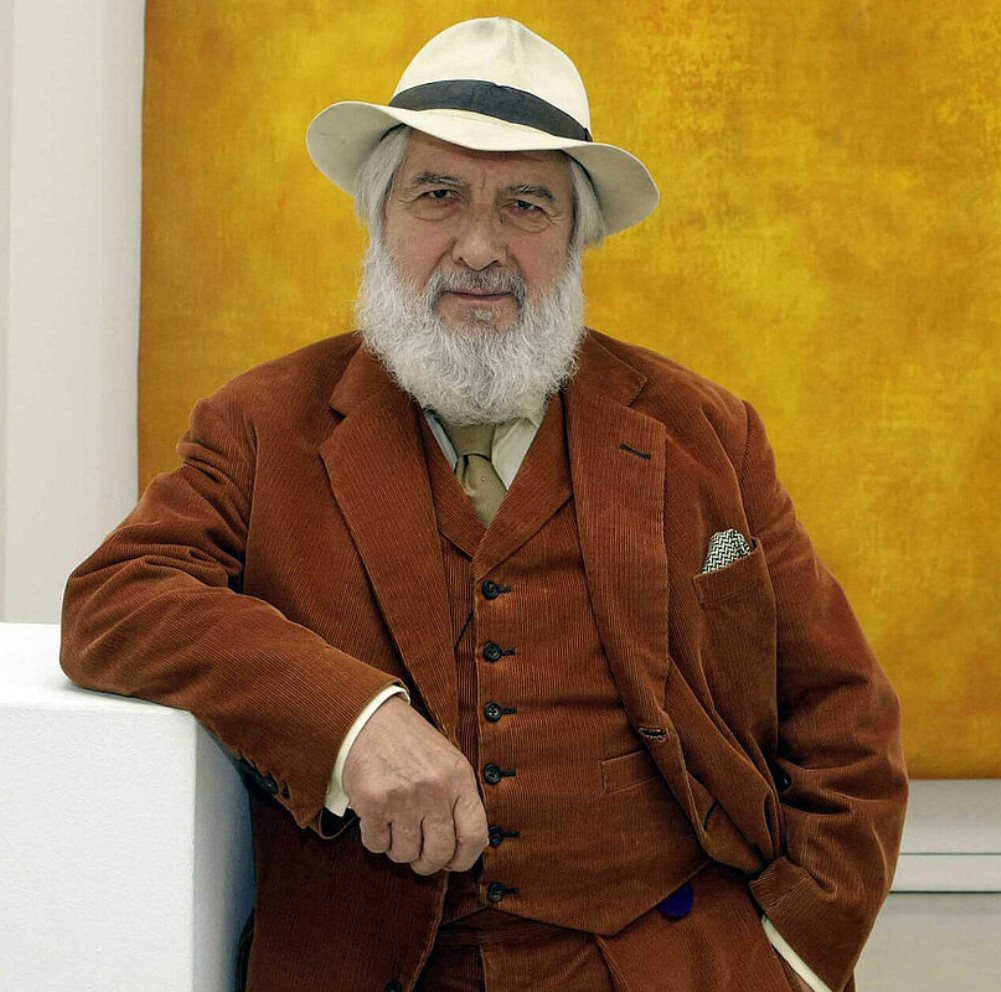
Gotthard Graubner was a German abstract painter associated with the post-war Zero and Informel movements. Graubner's work is known for its focus on color and its relationship to space and perception.
Graubner studied at the Kunstakademie Düsseldorf under the painter Georg Meistermann. In the 1950s, he became associated with the Zero group, a movement of artists who sought to create a new art form that was free of traditional artistic conventions and focused on the use of unconventional materials.
In the 1960s, Graubner began creating his signature "color-space bodies," large canvases that were mounted away from the wall and filled with thick layers of pigment. These works were designed to be experienced as three-dimensional objects that were both paintings and sculptures, and they often created a sense of depth and spatial ambiguity.
Graubner's work was exhibited widely in Europe and the United States, and he was the recipient of numerous awards and honors throughout his career. He also taught at several art schools, including the Kunstakademie Düsseldorf and the Städelschule in Frankfurt.
Graubner's innovative approach to painting and his exploration of the relationship between color, space, and perception continue to be an important influence on contemporary art.


Gotthard Graubner was a German abstract painter associated with the post-war Zero and Informel movements. Graubner's work is known for its focus on color and its relationship to space and perception.
Graubner studied at the Kunstakademie Düsseldorf under the painter Georg Meistermann. In the 1950s, he became associated with the Zero group, a movement of artists who sought to create a new art form that was free of traditional artistic conventions and focused on the use of unconventional materials.
In the 1960s, Graubner began creating his signature "color-space bodies," large canvases that were mounted away from the wall and filled with thick layers of pigment. These works were designed to be experienced as three-dimensional objects that were both paintings and sculptures, and they often created a sense of depth and spatial ambiguity.
Graubner's work was exhibited widely in Europe and the United States, and he was the recipient of numerous awards and honors throughout his career. He also taught at several art schools, including the Kunstakademie Düsseldorf and the Städelschule in Frankfurt.
Graubner's innovative approach to painting and his exploration of the relationship between color, space, and perception continue to be an important influence on contemporary art.


Gotthard Graubner was a German abstract painter associated with the post-war Zero and Informel movements. Graubner's work is known for its focus on color and its relationship to space and perception.
Graubner studied at the Kunstakademie Düsseldorf under the painter Georg Meistermann. In the 1950s, he became associated with the Zero group, a movement of artists who sought to create a new art form that was free of traditional artistic conventions and focused on the use of unconventional materials.
In the 1960s, Graubner began creating his signature "color-space bodies," large canvases that were mounted away from the wall and filled with thick layers of pigment. These works were designed to be experienced as three-dimensional objects that were both paintings and sculptures, and they often created a sense of depth and spatial ambiguity.
Graubner's work was exhibited widely in Europe and the United States, and he was the recipient of numerous awards and honors throughout his career. He also taught at several art schools, including the Kunstakademie Düsseldorf and the Städelschule in Frankfurt.
Graubner's innovative approach to painting and his exploration of the relationship between color, space, and perception continue to be an important influence on contemporary art.
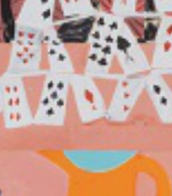

Gotthard Graubner was a German abstract painter associated with the post-war Zero and Informel movements. Graubner's work is known for its focus on color and its relationship to space and perception.
Graubner studied at the Kunstakademie Düsseldorf under the painter Georg Meistermann. In the 1950s, he became associated with the Zero group, a movement of artists who sought to create a new art form that was free of traditional artistic conventions and focused on the use of unconventional materials.
In the 1960s, Graubner began creating his signature "color-space bodies," large canvases that were mounted away from the wall and filled with thick layers of pigment. These works were designed to be experienced as three-dimensional objects that were both paintings and sculptures, and they often created a sense of depth and spatial ambiguity.
Graubner's work was exhibited widely in Europe and the United States, and he was the recipient of numerous awards and honors throughout his career. He also taught at several art schools, including the Kunstakademie Düsseldorf and the Städelschule in Frankfurt.
Graubner's innovative approach to painting and his exploration of the relationship between color, space, and perception continue to be an important influence on contemporary art.


Gotthard Graubner was a German abstract painter associated with the post-war Zero and Informel movements. Graubner's work is known for its focus on color and its relationship to space and perception.
Graubner studied at the Kunstakademie Düsseldorf under the painter Georg Meistermann. In the 1950s, he became associated with the Zero group, a movement of artists who sought to create a new art form that was free of traditional artistic conventions and focused on the use of unconventional materials.
In the 1960s, Graubner began creating his signature "color-space bodies," large canvases that were mounted away from the wall and filled with thick layers of pigment. These works were designed to be experienced as three-dimensional objects that were both paintings and sculptures, and they often created a sense of depth and spatial ambiguity.
Graubner's work was exhibited widely in Europe and the United States, and he was the recipient of numerous awards and honors throughout his career. He also taught at several art schools, including the Kunstakademie Düsseldorf and the Städelschule in Frankfurt.
Graubner's innovative approach to painting and his exploration of the relationship between color, space, and perception continue to be an important influence on contemporary art.


Gotthard Graubner was a German abstract painter associated with the post-war Zero and Informel movements. Graubner's work is known for its focus on color and its relationship to space and perception.
Graubner studied at the Kunstakademie Düsseldorf under the painter Georg Meistermann. In the 1950s, he became associated with the Zero group, a movement of artists who sought to create a new art form that was free of traditional artistic conventions and focused on the use of unconventional materials.
In the 1960s, Graubner began creating his signature "color-space bodies," large canvases that were mounted away from the wall and filled with thick layers of pigment. These works were designed to be experienced as three-dimensional objects that were both paintings and sculptures, and they often created a sense of depth and spatial ambiguity.
Graubner's work was exhibited widely in Europe and the United States, and he was the recipient of numerous awards and honors throughout his career. He also taught at several art schools, including the Kunstakademie Düsseldorf and the Städelschule in Frankfurt.
Graubner's innovative approach to painting and his exploration of the relationship between color, space, and perception continue to be an important influence on contemporary art.


Gotthard Graubner was a German abstract painter associated with the post-war Zero and Informel movements. Graubner's work is known for its focus on color and its relationship to space and perception.
Graubner studied at the Kunstakademie Düsseldorf under the painter Georg Meistermann. In the 1950s, he became associated with the Zero group, a movement of artists who sought to create a new art form that was free of traditional artistic conventions and focused on the use of unconventional materials.
In the 1960s, Graubner began creating his signature "color-space bodies," large canvases that were mounted away from the wall and filled with thick layers of pigment. These works were designed to be experienced as three-dimensional objects that were both paintings and sculptures, and they often created a sense of depth and spatial ambiguity.
Graubner's work was exhibited widely in Europe and the United States, and he was the recipient of numerous awards and honors throughout his career. He also taught at several art schools, including the Kunstakademie Düsseldorf and the Städelschule in Frankfurt.
Graubner's innovative approach to painting and his exploration of the relationship between color, space, and perception continue to be an important influence on contemporary art.


Gotthard Graubner was a German abstract painter associated with the post-war Zero and Informel movements. Graubner's work is known for its focus on color and its relationship to space and perception.
Graubner studied at the Kunstakademie Düsseldorf under the painter Georg Meistermann. In the 1950s, he became associated with the Zero group, a movement of artists who sought to create a new art form that was free of traditional artistic conventions and focused on the use of unconventional materials.
In the 1960s, Graubner began creating his signature "color-space bodies," large canvases that were mounted away from the wall and filled with thick layers of pigment. These works were designed to be experienced as three-dimensional objects that were both paintings and sculptures, and they often created a sense of depth and spatial ambiguity.
Graubner's work was exhibited widely in Europe and the United States, and he was the recipient of numerous awards and honors throughout his career. He also taught at several art schools, including the Kunstakademie Düsseldorf and the Städelschule in Frankfurt.
Graubner's innovative approach to painting and his exploration of the relationship between color, space, and perception continue to be an important influence on contemporary art.


Gotthard Graubner was a German abstract painter associated with the post-war Zero and Informel movements. Graubner's work is known for its focus on color and its relationship to space and perception.
Graubner studied at the Kunstakademie Düsseldorf under the painter Georg Meistermann. In the 1950s, he became associated with the Zero group, a movement of artists who sought to create a new art form that was free of traditional artistic conventions and focused on the use of unconventional materials.
In the 1960s, Graubner began creating his signature "color-space bodies," large canvases that were mounted away from the wall and filled with thick layers of pigment. These works were designed to be experienced as three-dimensional objects that were both paintings and sculptures, and they often created a sense of depth and spatial ambiguity.
Graubner's work was exhibited widely in Europe and the United States, and he was the recipient of numerous awards and honors throughout his career. He also taught at several art schools, including the Kunstakademie Düsseldorf and the Städelschule in Frankfurt.
Graubner's innovative approach to painting and his exploration of the relationship between color, space, and perception continue to be an important influence on contemporary art.


Gotthard Graubner was a German abstract painter associated with the post-war Zero and Informel movements. Graubner's work is known for its focus on color and its relationship to space and perception.
Graubner studied at the Kunstakademie Düsseldorf under the painter Georg Meistermann. In the 1950s, he became associated with the Zero group, a movement of artists who sought to create a new art form that was free of traditional artistic conventions and focused on the use of unconventional materials.
In the 1960s, Graubner began creating his signature "color-space bodies," large canvases that were mounted away from the wall and filled with thick layers of pigment. These works were designed to be experienced as three-dimensional objects that were both paintings and sculptures, and they often created a sense of depth and spatial ambiguity.
Graubner's work was exhibited widely in Europe and the United States, and he was the recipient of numerous awards and honors throughout his career. He also taught at several art schools, including the Kunstakademie Düsseldorf and the Städelschule in Frankfurt.
Graubner's innovative approach to painting and his exploration of the relationship between color, space, and perception continue to be an important influence on contemporary art.
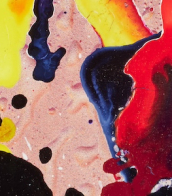

Gotthard Graubner was a German abstract painter associated with the post-war Zero and Informel movements. Graubner's work is known for its focus on color and its relationship to space and perception.
Graubner studied at the Kunstakademie Düsseldorf under the painter Georg Meistermann. In the 1950s, he became associated with the Zero group, a movement of artists who sought to create a new art form that was free of traditional artistic conventions and focused on the use of unconventional materials.
In the 1960s, Graubner began creating his signature "color-space bodies," large canvases that were mounted away from the wall and filled with thick layers of pigment. These works were designed to be experienced as three-dimensional objects that were both paintings and sculptures, and they often created a sense of depth and spatial ambiguity.
Graubner's work was exhibited widely in Europe and the United States, and he was the recipient of numerous awards and honors throughout his career. He also taught at several art schools, including the Kunstakademie Düsseldorf and the Städelschule in Frankfurt.
Graubner's innovative approach to painting and his exploration of the relationship between color, space, and perception continue to be an important influence on contemporary art.


Gotthard Graubner was a German abstract painter associated with the post-war Zero and Informel movements. Graubner's work is known for its focus on color and its relationship to space and perception.
Graubner studied at the Kunstakademie Düsseldorf under the painter Georg Meistermann. In the 1950s, he became associated with the Zero group, a movement of artists who sought to create a new art form that was free of traditional artistic conventions and focused on the use of unconventional materials.
In the 1960s, Graubner began creating his signature "color-space bodies," large canvases that were mounted away from the wall and filled with thick layers of pigment. These works were designed to be experienced as three-dimensional objects that were both paintings and sculptures, and they often created a sense of depth and spatial ambiguity.
Graubner's work was exhibited widely in Europe and the United States, and he was the recipient of numerous awards and honors throughout his career. He also taught at several art schools, including the Kunstakademie Düsseldorf and the Städelschule in Frankfurt.
Graubner's innovative approach to painting and his exploration of the relationship between color, space, and perception continue to be an important influence on contemporary art.


Gotthard Graubner was a German abstract painter associated with the post-war Zero and Informel movements. Graubner's work is known for its focus on color and its relationship to space and perception.
Graubner studied at the Kunstakademie Düsseldorf under the painter Georg Meistermann. In the 1950s, he became associated with the Zero group, a movement of artists who sought to create a new art form that was free of traditional artistic conventions and focused on the use of unconventional materials.
In the 1960s, Graubner began creating his signature "color-space bodies," large canvases that were mounted away from the wall and filled with thick layers of pigment. These works were designed to be experienced as three-dimensional objects that were both paintings and sculptures, and they often created a sense of depth and spatial ambiguity.
Graubner's work was exhibited widely in Europe and the United States, and he was the recipient of numerous awards and honors throughout his career. He also taught at several art schools, including the Kunstakademie Düsseldorf and the Städelschule in Frankfurt.
Graubner's innovative approach to painting and his exploration of the relationship between color, space, and perception continue to be an important influence on contemporary art.


Gotthard Graubner was a German abstract painter associated with the post-war Zero and Informel movements. Graubner's work is known for its focus on color and its relationship to space and perception.
Graubner studied at the Kunstakademie Düsseldorf under the painter Georg Meistermann. In the 1950s, he became associated with the Zero group, a movement of artists who sought to create a new art form that was free of traditional artistic conventions and focused on the use of unconventional materials.
In the 1960s, Graubner began creating his signature "color-space bodies," large canvases that were mounted away from the wall and filled with thick layers of pigment. These works were designed to be experienced as three-dimensional objects that were both paintings and sculptures, and they often created a sense of depth and spatial ambiguity.
Graubner's work was exhibited widely in Europe and the United States, and he was the recipient of numerous awards and honors throughout his career. He also taught at several art schools, including the Kunstakademie Düsseldorf and the Städelschule in Frankfurt.
Graubner's innovative approach to painting and his exploration of the relationship between color, space, and perception continue to be an important influence on contemporary art.


Gotthard Graubner was a German abstract painter associated with the post-war Zero and Informel movements. Graubner's work is known for its focus on color and its relationship to space and perception.
Graubner studied at the Kunstakademie Düsseldorf under the painter Georg Meistermann. In the 1950s, he became associated with the Zero group, a movement of artists who sought to create a new art form that was free of traditional artistic conventions and focused on the use of unconventional materials.
In the 1960s, Graubner began creating his signature "color-space bodies," large canvases that were mounted away from the wall and filled with thick layers of pigment. These works were designed to be experienced as three-dimensional objects that were both paintings and sculptures, and they often created a sense of depth and spatial ambiguity.
Graubner's work was exhibited widely in Europe and the United States, and he was the recipient of numerous awards and honors throughout his career. He also taught at several art schools, including the Kunstakademie Düsseldorf and the Städelschule in Frankfurt.
Graubner's innovative approach to painting and his exploration of the relationship between color, space, and perception continue to be an important influence on contemporary art.
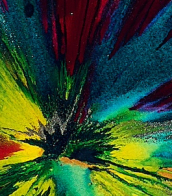

Gotthard Graubner was a German abstract painter associated with the post-war Zero and Informel movements. Graubner's work is known for its focus on color and its relationship to space and perception.
Graubner studied at the Kunstakademie Düsseldorf under the painter Georg Meistermann. In the 1950s, he became associated with the Zero group, a movement of artists who sought to create a new art form that was free of traditional artistic conventions and focused on the use of unconventional materials.
In the 1960s, Graubner began creating his signature "color-space bodies," large canvases that were mounted away from the wall and filled with thick layers of pigment. These works were designed to be experienced as three-dimensional objects that were both paintings and sculptures, and they often created a sense of depth and spatial ambiguity.
Graubner's work was exhibited widely in Europe and the United States, and he was the recipient of numerous awards and honors throughout his career. He also taught at several art schools, including the Kunstakademie Düsseldorf and the Städelschule in Frankfurt.
Graubner's innovative approach to painting and his exploration of the relationship between color, space, and perception continue to be an important influence on contemporary art.


Gotthard Graubner was a German abstract painter associated with the post-war Zero and Informel movements. Graubner's work is known for its focus on color and its relationship to space and perception.
Graubner studied at the Kunstakademie Düsseldorf under the painter Georg Meistermann. In the 1950s, he became associated with the Zero group, a movement of artists who sought to create a new art form that was free of traditional artistic conventions and focused on the use of unconventional materials.
In the 1960s, Graubner began creating his signature "color-space bodies," large canvases that were mounted away from the wall and filled with thick layers of pigment. These works were designed to be experienced as three-dimensional objects that were both paintings and sculptures, and they often created a sense of depth and spatial ambiguity.
Graubner's work was exhibited widely in Europe and the United States, and he was the recipient of numerous awards and honors throughout his career. He also taught at several art schools, including the Kunstakademie Düsseldorf and the Städelschule in Frankfurt.
Graubner's innovative approach to painting and his exploration of the relationship between color, space, and perception continue to be an important influence on contemporary art.


Gotthard Graubner was a German abstract painter associated with the post-war Zero and Informel movements. Graubner's work is known for its focus on color and its relationship to space and perception.
Graubner studied at the Kunstakademie Düsseldorf under the painter Georg Meistermann. In the 1950s, he became associated with the Zero group, a movement of artists who sought to create a new art form that was free of traditional artistic conventions and focused on the use of unconventional materials.
In the 1960s, Graubner began creating his signature "color-space bodies," large canvases that were mounted away from the wall and filled with thick layers of pigment. These works were designed to be experienced as three-dimensional objects that were both paintings and sculptures, and they often created a sense of depth and spatial ambiguity.
Graubner's work was exhibited widely in Europe and the United States, and he was the recipient of numerous awards and honors throughout his career. He also taught at several art schools, including the Kunstakademie Düsseldorf and the Städelschule in Frankfurt.
Graubner's innovative approach to painting and his exploration of the relationship between color, space, and perception continue to be an important influence on contemporary art.


Gotthard Graubner was a German abstract painter associated with the post-war Zero and Informel movements. Graubner's work is known for its focus on color and its relationship to space and perception.
Graubner studied at the Kunstakademie Düsseldorf under the painter Georg Meistermann. In the 1950s, he became associated with the Zero group, a movement of artists who sought to create a new art form that was free of traditional artistic conventions and focused on the use of unconventional materials.
In the 1960s, Graubner began creating his signature "color-space bodies," large canvases that were mounted away from the wall and filled with thick layers of pigment. These works were designed to be experienced as three-dimensional objects that were both paintings and sculptures, and they often created a sense of depth and spatial ambiguity.
Graubner's work was exhibited widely in Europe and the United States, and he was the recipient of numerous awards and honors throughout his career. He also taught at several art schools, including the Kunstakademie Düsseldorf and the Städelschule in Frankfurt.
Graubner's innovative approach to painting and his exploration of the relationship between color, space, and perception continue to be an important influence on contemporary art.
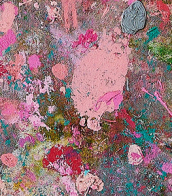

Gotthard Graubner was a German abstract painter associated with the post-war Zero and Informel movements. Graubner's work is known for its focus on color and its relationship to space and perception.
Graubner studied at the Kunstakademie Düsseldorf under the painter Georg Meistermann. In the 1950s, he became associated with the Zero group, a movement of artists who sought to create a new art form that was free of traditional artistic conventions and focused on the use of unconventional materials.
In the 1960s, Graubner began creating his signature "color-space bodies," large canvases that were mounted away from the wall and filled with thick layers of pigment. These works were designed to be experienced as three-dimensional objects that were both paintings and sculptures, and they often created a sense of depth and spatial ambiguity.
Graubner's work was exhibited widely in Europe and the United States, and he was the recipient of numerous awards and honors throughout his career. He also taught at several art schools, including the Kunstakademie Düsseldorf and the Städelschule in Frankfurt.
Graubner's innovative approach to painting and his exploration of the relationship between color, space, and perception continue to be an important influence on contemporary art.



